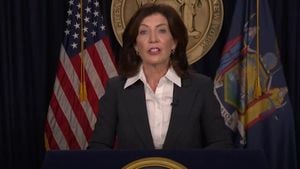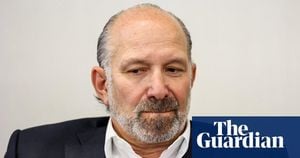The Biden administration is gearing up for some significant changes, with several high-profile resignations on the horizon. This shakeup is likely to reflect the overall dynamics within the administration as it approaches the halfway point of the presidential term. Key figures are stepping aside, and the motives behind these departures are stirring curiosity and speculation.
Recently, one of the notable resignations announced is from Jessica Rosenworcel, the Chair of the Federal Communications Commission (FCC), who plans to leave her post on January 20. Having served as the FCC chair since January 2021, Rosenworcel has been pivotal in advancing policies aimed at improving broadband access and addressing digital equity, especially during the COVID-19 pandemic.
Rosenworcel's tenure has seen significant initiatives targeting broadband expansion and misinformation online, which are increasingly important issues as society relies more on digital connectivity. Her decision to step down reflects broader trends within the Biden administration, which has faced various challenges during its term.
Rosenworcel cited personal reasons for her departure, stating her desire to shift focus toward family commitments and other interests outside of government. "It was not an easy decision for me, but it is the right one for my family at this time," she commented, emphasizing her love for public service and her colleagues at the FCC.
Her resignation is not isolated. A few other prominent administration officials are also expected to announce their departures soon. These potential exits could signify both personal choices and strategic shifts within the administration's priorities as it recalibrates its focus heading toward the upcoming elections.
A source closely monitoring these developments has indicated the administration is aware of the turbulence this could cause, with various initiatives possibly taking longer to execute if key leadership roles remain unfilled. Deputy directors and team leads within agencies are stepping up to fill the void, but the effective functioning of these bodies often hinges on having confirmed leaders at the helm.
Looking at the bigger picture, the anticipated resignations come at a sensitive time politically, as the Democratic Party gears up for the midterm elections next year. Analysts project these changes could impact the administration's political strategies, particularly as party dynamics evolve and the leaders weigh their options moving forward.
Meanwhile, Rosenworcel’s departure promises to leave the FCC at a crossroads, considering the recent challenges it has faced, including controversies surrounding new user data policies and net neutrality debates. With her advocacy for consumer protection and public safety, her void could shift the agency’s direction and priorities significantly.
The political climate within the White House tends to mimic real-life dramas, with exits and entries reshaping the narrative almost daily. Each resignation sends ripples across the political spectrum, providing fodder for opponents as well as opportunities for rising stars within the ranks.
When Rosenworcel made history by becoming the first woman to lead the FCC, she expressed the significance of representation and diversity at the table. Her successors will have large shoes to fill and will undoubtedly face intense scrutiny over the agency’s handling of pressing issues left unresolved during her tenure.
The upcoming resignations served as reminders of the transient nature of political life, reflecting on the dedication of public servants and their journeys through appointments. This suggests there may be opportunities for fresh perspectives at the FCC and other agencies within the government, provided the administration strategizes effectively moving forward.
Despite all the chatter surrounding these changes, the administration remains optimistic about its upcoming plans and initiatives. While some officials might leave, others are stepping up, ensuring continuity where it matters the most.
The question now is whether the leadership shakeup will spark elevated transformations across federal agencies or lead to stagnation as the administration might take time to find the right replacements. All eyes will be on President Biden to see how effectively he can fill those roles and redefine the narrative of his administration.
For political observers, this phase presents both excitement and trepidation about the administration's course. With midterms on the horizon and strategic vacancies, it could become the perfect storm for candidates and activists on both sides to redefine their platforms.
Rosenworcel’s resignation set off discussions about who might take over the FCC and whether this shift could propel different priorities within the agency. It adds another layer of intrigue to the political ecosystem—creating space for individuals who may bring new ideas and strategies to the forefront.
This period of transition symbolizes more than just the departing individuals; it's about the broader message being sent about service, commitment, and the willingness to step aside to create new paths for others. The public will be watching closely to see how these shifts reflect on policy and governance, hoping for continuity amid changes.
With speculation rife about other potential resignations beyond Rosenworcel, both the press and constituents are left pondering the future of the Biden administration as the team prepares for what lies ahead. No one knows who will emerge as the next key player or how these changes will shape the political narrative. The possibilities remain open, and the intrigue is palpable.
Expectations remain high as new players step up, and the coming weeks will reveal how the administration manages these changes. Will it emerge stronger, or will the transitions impede its current activities and initiatives? Time will undoubtedly tell as this political drama continues to unravel.



